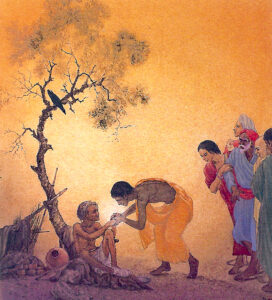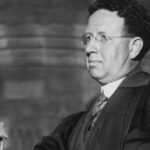
Ten lepers cried, “Have mercy on us!” Why so many lepers? Jesus was in a wilderness area between Galilee and Samaria. A no-person’s land. The mayor of Jerusalem, like some NY mayor, put all the undesirables, the blind, the lame, the lepers, on camels and relocated them in this hellhole – biblical New Jersey. The place was crawling with lepers and Jesus was there. Jesus was there in the muck and ruin of humanity – the thrown away, the discarded, the expelled.
Most of us don’t identify with the lepers, but you should remember how people with AIDS were once treated. We are not lepers, we cry. We are not desperate enough to think we might need some mercy. This is the cry of wounded, hurt, sick people who are the end of the road – Wit’s End Blvd.
Lepers were treated with disgust. We may not know any lepers, but we know the disgust. We read it in the statements of politicians in scathing comments about transgenders. We hear it in dehumanizing rhetoric about political opponents. We know the emotional atmosphere created around people who are “like lepers.”
But most of us don’t live on Wit’s End Blvd. We may not live on Easy Street, but we think we are doing OK. And a lot of people think they are doing OK without help. They don’t need God’s help. You can invite someone to church, and they will look at you like you are crazy. Or they will smile and say, “My wife and I were just talking about going to church. Great idea preacher. We will be there Sunday!” He’s lying through his teeth.
So many people are going it alone. One is the loneliest number crooned Three Dog Night. Even with affluence and half-baked happiness, Wit’s End Blvd is as crowded as the land of lepers traipsing around in packs.
David Brooks says, “We’ve had 60 years of self, self, self. We’ve overdone it so we have to turn a cultural corner and find a better way to live,” he said. The first rule for anyone in the throes of some prison of a disease, is the admission of the need for help. I have heard it said that you can’t help anyone until they say out loud that they need help.
Ten lepers called out, “Jesus, Master, have mercy on us!” That’s not what people are saying to the church. They are not saying anything at all to us. The church no longer counts in our culture. Other sanctuaries have sprung up to take our place.
I served a fantastic church as interim pastor. We hosted the most amazing, fantastic brunch there on the last Sunday of the month. So many people showed up to be fed, but only rarely did one of them show up for church. They asked for bar-b-que chicken but not for mercy. Even the homeless thought the church couldn’t help. We provided food, but not mercy. We needed to do both. It’s an odd situation. Church members don’t attend the brunch; homeless people won’t attend the church.
Of all things, Jesus says: “Go show yourself to the priests.” All ten galloped to the priests. They did the word of God. But faith is not an overnight thing. I recall Percy Sledge singing about love not being an overnight thing. Well, faith is like that. You have to feed it every day, especially on the Lord’s Day. But this initial act of obedience, this moment of faith, was enough to heal all ten lepers. On the way, they were healed. Faith is a powerful thing. God is so generous, so good. A lot of good can happen if you just head back to the place you once belonged. The church beckons its people back home again.
Then Jesus asks, “Where are the nine?” This is my question every Sunday morning. Where’s everybody? I think that every morning at breakfast, the prodigal son’s father asked, “Is my son back? Is he here? Has he come home?” Where are the nine? I think church can become a secondary thought with no sense of joy, connection to one another, meaning. Just going through the motions and then one day gone for good.
As a church we have a responsibility to our brothers and sisters to help them come home again. Maybe some of them need to know that we beg their forgiveness for any way in which they have been hurt, harmed, or angered. Maybe some of them need to know that they really matter to us. Maybe some people need to know that church is not a gathering of little in-groups and cliques. Maybe, hell, I don’t know. It drives me crazy not to know.
Luke tells us that one came back. Jesus exults over the one who came back glorifying and thanking and praising God. We mainliners think some praise is a little over-the-top. Fred Craddock says the woods are full of people who have been subjected to bad church experiences. I think church can be a difficult space to negotiate.
Remember that scene in Good Will Hunting. Sean, the therapist, and Will are having a session:
Sean: Look at me son.
Sean: It’s not your fault.
Will: I know.
Sean: No. It’s not your fault.
Will: I know
Sean: No, no, you don’t. It’s not your fault.
Sean: Hmm?
Will: I know.
Sean: It’s not your fault.
Will: Alright.
Sean: It’s not your fault.
Sean: It’s not your fault.
Will: Don’t mess with me, Sean, not you!
Sean: It’s not your fault. It’s not your fault.
[Will breaks into sobs. They hug]That’s what I want to do. I want to tell everyone who has been hurt by church, “It’s not your fault.”
Look at the one who turned back to Jesus. See him down on the ground, whooping it up, glorifying God, giving thanks to Jesus as a one-man praise man offering a nonstop cantata of praise. “Let us give thanks to God.” Martin Luther once defined worship as “The tenth leper turning back!” But we are uneasy at such public displays of emotion.
I watched the new movie about Elvis Presley’s manager, Colonel Tom Parker. The story the movie tells is that Elvis, as a young boy, was influenced by the music in the African American honky tonk, the dancing, the music of Beale Street, and tent revival Pentecostal worship. Elvis figured out how to put real feelings into the hearts of his fans. It scared the normal world, the buttoned-down, uptight world.
I believe there are moments when we experience deep feelings and we should, once-in-a-while express those feelings out loud to one another or in worship. Our bodies are mobilized by the unruly matrix of dense affects working their way through us. The cognitive scientists tell us our emotions are radically precognitive, preconscious, and nonconceptual forces that shape subjectivity upstream of self-awareness. In other words, we are what we subconsciously feel and sometimes this overrides facts. Lawrence Grossberg writes that affect “encompasses a variety of ways in which we ‘feel’ the world in our experience, including moods, emotions, maps of what matters and of what one cares about, pleasures and desires, passions, and sentiments.” And much of it – subconscious.
I am going to pray that you will have a moment here and now when you ask God for mercy. You may need to whisper it the first few times, “Lord, have mercy. Have mercy, have mercy on me.”
I want to send you home with a story about a young woman who had a career as a jazz singer in Los Angeles. She came home once a year to her father’s country church for homecoming. This be her last Sunday in church. I wonder if people remember the last Sunday they were in church? Her name – Veronica.
“She had made up her mind not to suffer through another of his meaningless, meandering sermons. Sermons of no use to anyone but Zion’s dead and dying.” Is that the real problem? Is it the preaching that’s killing the church?
During the service Veronica refused to hum with the choir or sing with the congregation. Her father preached then a quiet sermon about the prodigal son coming home. One sister said, “Unusual sermon. Nobody got happy.” Veronica sneered at the idea.
As the choir started singing the closing hymn, Veronica relaxed and thought, one more benediction and her last Hope of Zion service would be over. Suddenly, the pianist caught fire. The choir and the congregation joined right in. Clapping and rocking to the music. People were singing: “Something got a hold – got a hold on me; Oh, yes it did, right now! Something!”
The church sang as if the song would be taken away from them any minute. Veronica felt her knees knocking together. Her hands grew cold and clammy; the blood pounded in her head. They were drawing her into it. “No,” she cried. She pressed her thighs together; interlaced her fingers tightly; clenched her teeth, gripped the edge of the pew. “It was the Holy Ghost” sang the choir. “It was the Holy Ghost” answered the congregation.
As though thrust from the bench, Veronica sprang up, her fists clenched tightly, arms waving stiffly in the air, head thrown back and mouth stretched open in a silent scream of horrified joy.
One came back. One. Will you help someone we know be the next one?










